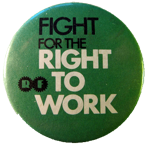Near the end of February, the Wisconsin legislature passed a controversial bill that could change the face of labor in the state. Under the new “right-to-work” law, employees in unionized, private sector workplaces can choose whether or not to pay their union dues. According to Governor Scott Walker and his supporters, the law grants more freedom for individuals to choose where they work. “This legislation will ensure that Wisconsin’s workers have the sole power to determine whether they wish to belong to or support a labor organization,” said Wisconsin Senator Scott Fitzgerald.
Opposition to the legislation has been fierce, however, with critics decrying the law as a threat to workers’ collective bargaining rights. After all, labor unions have historically been the most effective organizations at debating contentious issues with management. With no legal requirement for workers to pay dues, though, many believe Wisconsin’s unions will have far less power to fight for their members’ rights. “It’s bad for the working men and women of this state, both union and nonunion,” said Wisconsin Senator Dave Hansen.
This isn’t the Dairy State’s first standoff with unions, either. Governor Walker first made national news in 2011 when he sought to push through legislation that slashed collective bargaining rights for state employees. That law passed as well, even in the face of a public outcry that often saw the state capitol building filled with shouting protestors. In fact, after decades of pro-union sentiment, many Midwestern states have adopted similar right-to-work legislation in recent years. Indiana and Michigan got the ball rolling in 2010 when both state legislatures introduced right-to-work bills that eventually passed. The amount of union members working in Michigan has dropped from 16.6 percent to 14.5 percent since the law was enacted. Meanwhile, legislators in Missouri and New Mexico could be the next states in line to adopt right-to-work rules.
Questions:
- Why are unions vehemently opposed to “right-to-work” laws?
- Once a union is formed in the workplace, can workers decide to eliminate it?
Source: Ben Kesling and Mark Peters, “Wisconsin Senate Passes ‘Right to Work’ Bill Amid Protests,” The Wall Street Journal, February 26, 2015; Monica Davey, “Unions Suffer Latest Defeat in Midwest with Signing of Wisconsin Measure,” The New York Times, March 9, 2015. Photo by: Dan Birchall.

